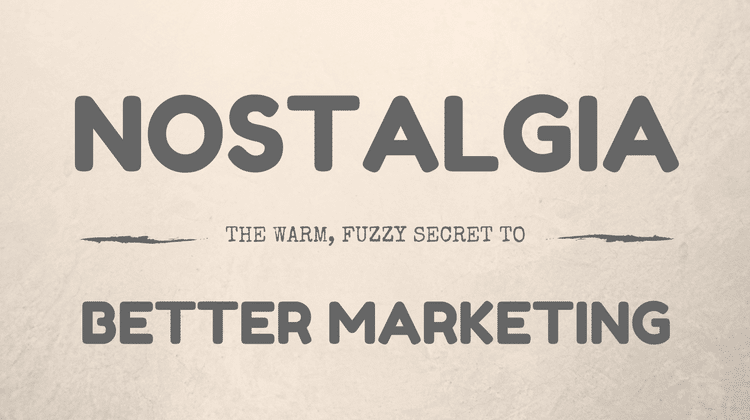
We’ve all been there before: you’re walking through the store and BAM—you see something that sparks a thousand childhood memories. Before you know it, you’re standing in the middle of the store, smiling to yourself, thinking, “I need to get this.”
What is it about these memories that makes us want to buy? Is it the warm feeling of watching the sun set over the backyard, knowing mom will call you in for dinner any time? The memories of life with less technology and more imagination? Whatever thoughts these products induce, they all have one thing in common: nostalgia.
Nostalgia Wins
Nostalgic marketing content wins over audiences everywhere regardless of the product. Companies of all types have taken advantage of this tactic to increase their sales. Cereal, soda, and video game brands, for example, have released limited edition “throwback” versions of their products in an attempt to appeal to many generations. All of a sudden, soda was served in glass bottles for the first time since the 1980’s; chip bags reverted back to their simplistic designs and logos; and jerseys of sports teams of all kinds displayed the last names of team members from 1997.
As earlier versions of products are released, buyers claim that something about the old packaging makes snacks taste better or gives them hope that their favorite team would win the series again. Even TV stations have caught on to the trend by airing episodes from the 90s and early 2000s—a tactic that has compelled audiences to turn to networks they haven’t laid eyes on since they were teenagers.
The Power of a Throwback
What sort of magic lies behind the power of a throwback? The product hasn’t changed—just the packaging. Yet for some reason, this new-old merchandise appeals to consumers more than its modern take.
People are drawn to nostalgic products because they provide a feeling of connectivity with current trends and old traditions. They allow older consumers to say, “I remember this,” and younger consumers to say, “So this is what it was like.” Whether or not the consumer lived the original experience, they can’t help feel their curiosity pique.
How to Leverage Nostalgic Marketing in Your Business
Obviously, companies that have stayed in business since the Civil War have a pretty easy time returning to their original roots. The good news, however, is that your company doesn’t necessarily have to be around for years to employ nostalgic marketing techniques. Startups and veteran businesses alike can use nostalgia to their advantage. In fact, using a throwback technique just might be the key to attracting customers to your business.
If your company is out of ideas or stuck on where to go next, going back in time should be your next step. Consider old designs that work well with new ideas. Think of colors and fonts that evoke childhood memories. Use your favorite memories to tap into information you haven’t thought about in a long time. Nostalgia allows us to push aside current thoughts and trends and think about new twists on original ideas.
Think about the times when you have used a product, eaten a long-time favorite snack, or watched a television show and thought, “Wouldn’t it be great if ______ was more like it was ten years ago?” Or, “Remember when they sold _____? Why’d they ever get rid of those?” Chances are, you aren’t alone; hundreds of people probably think the same thing every time they use that product.
As an entrepreneur, you have the means to give them what they want through your own business. Listen to your audience. If the demand for a retired product returns, then return the product. Recognizing the missing links in a market is the key to providing consumers with exactly what they’re asking for.
Why Nostalgia Works
The reason nostalgia marketing works so well is because it reaches audiences on an emotional level rather than just appealing for the sake of utility. It humanizes products by tapping into the personal events of someone’s life that were meaningful, impactful, or shared with loved ones.
In the simplest terms, nostalgia inspires us. We are able to use popular trends of old times to create something that combines our favorite recollections with contemporary flare. Better yet, it allows consumers to feel as though businesses took the time to dig into the roots of their past and apply it to new products. Styles are known to recur the same way history repeats itself. Styles that seem vintage attract an audience that aspires to return to, or see what it feels like to be part of, older years.
In fact, some marketing specialists argue that people become more nostalgic when they are anxious about the present and future endeavors. Returning to the past allows the consumer to feel a sense of comfort that they rely on in times of hardship or unrest. Nostalgic campaigns should induce feelings of simplicity. In the midst of calamity, we yearn for times when life seemed less complex and more content. And, for many, retail trumps any therapist out there.
Using nostalgia in your marketing techniques allows you to create something new, but familiar. Make your audience remember the happiness of neighborhood barbecues on summer nights and the victory of a high school football game. Sometimes originality stems from ordinary occurrences that you just haven’t thought about in a while.
Try it out! See what kinds of ideas are fueled on the throwbacks of your own childhood. It might surprise you just how many other people relate to the same things—and they’ll thank you for reminding them.
About the Author
Kathryn Esper writes for Factor Finders, which helps businesses of all sizes find the working capital they need.